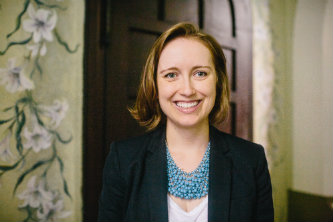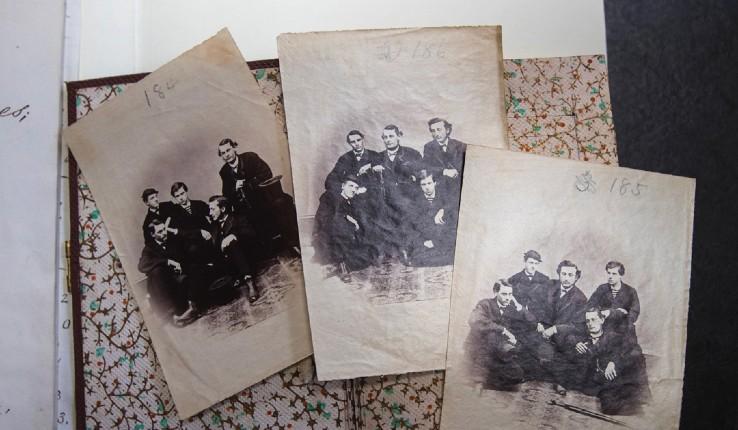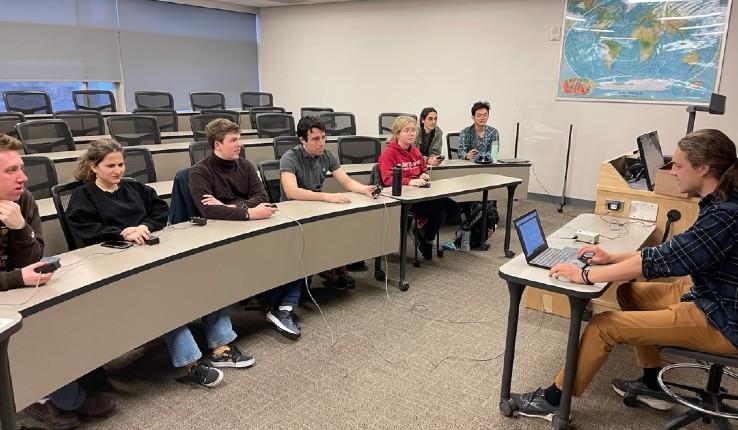English and history departments receive NEH grant

The Next Generation Ph.D. planning grant supports new approaches to graduate study in the humanities.
Jenna Lay, associate professor of English and director of graduate studies for the English department, entered the academic job market in 2008. The economic crash that autumn resulted in the elimination of many of the positions to which she’d applied.
She was lucky, she said, to get a post-doctoral position at the University of Texas at Austin when she completed her Ph.D. and then, a year later, her position at Lehigh.
“That two years of being on a very difficult job market [made me recognize] that things had changed substantially for Ph.D. students in the humanities, and that the pipeline toward an academic job—if it ever existed, and I’m skeptical that it ever really existed—essentially just fell apart,” said Lay. “So I was very aware of that coming into my job and tried to be supportive of our Ph.D. students from the beginning.”
In 2013, Lay established and took on the role of job placement officer for the department of English. For two years she helped students prepare job materials, surveyed current and former students and tracked the history of English M.A. and Ph.D. job placements at Lehigh.
“I’ve talked individually with students who came in thinking they might want an academic job and then realized over the course of the Ph.D., this isn’t quite for me,” said Lay. “What I’ve been trying to do is create a space where students feel comfortable expressing that. Many graduate students across the country have fears that if they say they don’t want an academic job, faculty won’t take them seriously, won’t care as much about their work or won’t be as supportive of them. [I want to] make it clear that many different jobs are worthwhile and meaningful and important [and] that non-academic careers demonstrate success as well.”
A $25,000 grant awarded to Lehigh by the National Endowment for the Humanities (NEH) falls in line with that goal. The Next Generation Ph.D. planning grant is part of a new NEH program that aims to support “a transformation of how Ph.D. candidates in the humanities study for their degrees and are prepared for a broader range of careers at the conclusion of their often years-long, intensely academic graduate school experiences.” The award requires Lehigh to provide matching funds to ensure institutional commitment and builds on the momentum of the $500,000 NEH challenge grant awarded last year to Lehigh’s Africana Studies program, which is being used to create an endowment to expand the program. Work includes enhancing curriculum, increasing public humanities initiatives and strengthening community partnerships.
Lehigh’s English and history departments have partnered for the new NEH project, titled “Public Pedagogies: Graduate Education and the Interdisciplinary Humanities at Lehigh University.” Although Lehigh categorizes history as a social science, the NEH categorizes it, like English, as humanities.
“The timing and focus of the NEH grant couldn't be better for History,” said John Pettegrew, associate professor of history and chair of the history department. “Building upon our long-standing work in local history and community engagement, new public-facing scholarship will be a leading edge of our Ph.D. program over the next few years. Digital media and documentary film will certainly play a part in this development; most crucial will be creating new pathways of relevance between our students' expertise and research, on the one hand, and pressing social and political concerns, on the other.”
Increased support for graduate students
Lay, the grant’s project director, said the planning grant offers a “place-specific” opportunity to “take conversations [about graduate studies and job placement] that may be happening in individual departments and bring them to the university level.
“One of the things I was focused on in writing the grant application was making this specific to what we do especially well and what we have historically done very well in training doctoral students,” said Lay. “And that has been teaching, in many ways. We have trained a lot of wonderful Ph.D. students for careers at teaching-centric colleges.... So the goal is to think carefully about how that emphasis on teaching that has historically been present in our doctoral programs might flourish in relationship to Lehigh’s strengths in community engagement.”
Work on the one-year project begins this fall and a core committee, a consulting committee and a series of working groups will focus on five areas:
• Curricular development: Committees and working groups will consider the future of Lehigh’s graduate curriculum in history and English, concentrating on coursework that might best meet student needs as well as interdisciplinary opportunities to expand student skillsets.
• Co-curricular activities: In order to help graduate students in English and history gain professional skills, committees and working groups will explore sustainable funding opportunities and partnerships to enable student internships in various administrative offices on campus.
• Off-campus internships: The Next Generation Ph.D. grant provides funding for four graduate students to complete professional internships at community organizations in summer 2017. “We’ve got a lot of amazing opportunities in the area and a lot of undergraduate students are doing these types of things. Enabling our graduate students to have those same kinds of enriching opportunities would be extremely valuable,” said Lay.
• A mentorship and advisory network: An advisory council comprised of former graduate students who have followed different career paths will be developed for both the English and history departments. Members will provide insight and guidance to faculty working on these issues and to current students as they navigate employment prospects.
• New models for dissertation research: Committees and working groups will explore different approaches to dissertation research “that would still be intellectually rigorous but would enable students to think more broadly about possibilities,” said Lay. The grant provides funding for summer dissertation fellowships for students considering new forms for the dissertation.
“This award will help us transform doctoral education in the humanities at Lehigh and provide powerful opportunities to reimagine how we educate students in a rapidly changing marketplace,” said Donald E. Hall, Herbert J. and Ann L. Siegel Dean of the College of Arts and Sciences. “This funding allows us to explore innovative approaches to doctoral training that might not otherwise be possible.”
Pat Farrell, provost and vice president for academic affairs, said, “This grant provides a valuable opportunity to explore ways in which we might better serve our graduate students in English and history during their time at Lehigh and as they enter an ever-evolving job market. This new partnership with the NEH recognizes and supports the already exemplary work of our faculty as they inspire intellectual curiosity, encourage public engagement and prepare students for the careers that suit them best.”
The National Endowment for the Humanities, created in 1965, supports research and learning by funding high-quality projects in fields that include history, literature, philosophy and archeology. In announcing its latest grant recipients, the NEH said the projects that were chosen will strengthen the nation’s cultural fabric and identity.
Photos by Christa Neu
Posted on:





